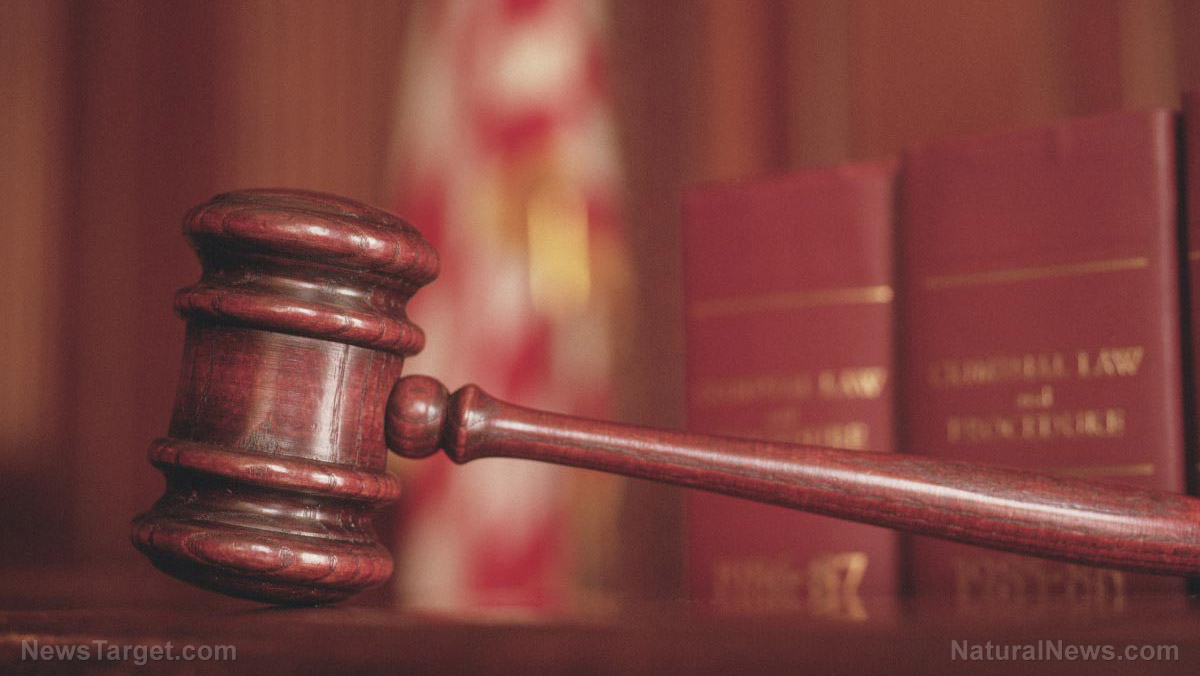
Advertisement
This is a partial reprinting of “The Censorship Master Plan Decoded,” available at this link (PDF).
The Censorship Master Plan Decoded (i.e. “The Adams Report”)
The blueprint for how tech giants covertly silence online speech, and how America can fight back against corporate tech monopolists
The United States government has a compelling interest in preserving the marketplace of free ideas, even when those ideas are unpopular or consist of criticism against the government itself.
To accomplish this goal, the United States Congress must act with urgent legislation, and relevant regulators (FCC, FTC) must assert regulatory oversight that protects a fair and free marketplace of ideas across the ‘net. We need, in other words, an “Internet Freedom Act.”
Below, I list some suggestions of possible legislative or regulatory strategies that may be worthy of further exploration for protecting the “online dignity” of Americans. In terms of naming these laws, terms and phrases that might be useful include:
- Online Bill of Rights
- The Online Dignity Act
- The Right to Exist Online Act
- The Internet Freedom Act
- The Online Human Rights Act
Here are some suggested legislative and regulatory solutions that may be worthy of additional exploration:
1) DECLARE THE DOMINANT ONLINE PLATFORMS OF SPEECH TO BE “PUBLIC COMMONS” COMMUNICATIONS INFRASTRUCTURE, ESSENTIAL FOR INDIVIDUAL PARTICIPATION IN MODERN SOCIETY
When an online platform reaches over 50% market penetration in its appropriate sector (such as social media, search, videos, etc.) it should be deemed an “essential service” for the public at large, making it subject to laws and regulations that prohibit discriminatory censorship.

2) OUTLAW THE CENSORING OF CONTENT BASED ON POLITICAL VIEWS OR “UNPOPULAR” VIEWS ON SCIENCE, MEDICINE, HISTORY AND RELIGION
As part of the legislative and regulatory reforms that are needed today, lawmakers should specifically name content areas (subject matter) which are protected by those laws. Protected topics must include politics, science, medicine, history, religion, sexuality and others.
3) REQUIRE INTERNET GATEKEEPERS TO OPEN ALL THEIR BLACK BOXES AND PUBLISH THEIR RANKING ALGORITHMS
To halt the “voodoo” black box algorithm tweaking that artificially boosts left-wing news publishers while punishing conservative or independent sites, dominant search engines, video platforms and social media platforms must publicly disclose their ranking algorithms, feed broadcast algorithms and other internal engines which determine public visibility of content.
4) REQUIRE TECH GIANTS TO PUBLICLY DISCLOSE THEIR CENSORSHIP, DEPLATFORMING AND DOWN-RANKING CONTENT POLICIES
If tech giants are going to ban content creators for expressing conservative ideas, such companies must publicly and unambiguously disclose that this is their policy. Rather than hiding behind the false justifications of “hate speech” or “fake news,” tech giants must be honest about naming the philosophies and ideas they are going to ban.
For example, YouTube must publicly state that it does not allow videos promoting CBD or medicinal hemp. Facebook must state that pro-Trump speech will be banned. And Twitter must state that if you issue death threats to people while being a conservative, you will be banned, but if you issue death threats while being a liberal, such attacks will be openly tolerated.
5) FINE INTERNET GATEKEEPERS FOR COMMITTING SELECTIVE, POLITICALLY-MOTIVATED CENSORSHIP
Enact laws that allow the FTC or FCC to issue large fines when dominant tech giants engage in politically-motivated censorship. Such fines should start at $1 billion and go up from there.
6) INVOKE RICO ACT INDICTMENTS AND PROSECUTIONS AGAINST FACEBOOK, ALPHABET AND OTHER INTERNET GATEKEEPERS FOR WAGING MAFIA-STYLE CAMPAIGNS OF INTIMIDATION AND OPPRESSION
On the law enforcement side, Facebook and other tech giants are already engaged in racketeering activities which could be prosecuted under existing law. This would, of course, first require reestablishing the important of the rule of law at both the FBI and DOJ. Perhaps Robert Mueller should drop the issue of Russian jokers and instead take up the investigation of American tech traitors.
7) SEEK CRIMINAL INDICTMENTS AGAINST FACEBOOK, GOOGLE, YOUTUBE AND TWITTER FOR INTERFERING IN THE 2018 ELECTIONS AND COMMITTING WHAT ROBERT MUELLER CALLS A “CONSPIRACY TO DEFRAUD THE UNITED STATE OF AMERICA”
Robert Mueller charged a Russian company with attempting to defraud the United States of America by running ads on Facebook. Yet what Facebook itself does to silence conservative voices across America is a far more serious attempt to defraud America and sway elections. By silencing conservative voices in a coordinated, malicious campaign, tech giants are right now attempting to “steal” the 2018 mid-term elections.
8) PASS LAWS THAT ALLOW INDIVIDUALS WHO HAVE BEEN CENSORED FOR POLITICAL REASONS TO SUE THE DOMINANT ONLINE PLATFORMS FOR ACTUAL DAMAGES AND PUNITIVE DAMAGES
One way to halt online censorship by tech giants is to make it financially unwise for them to engage in such actions. This can be achieved by passing laws that allow the victims of censorship — whose personal lives, professional lives and small businesses have been destroyed — to sue the tech giants for damages.
9) REQUIRE INTERNET GATEKEEPERS TO BE TRANSPARENT ABOUT SHADOW BANNING, CONTENT BANNING AND ACCOUNT BANNING
When online platforms engage in shadow banning, they must be transparent with content creators about the extent of that ban. Instead of “secret” bans — which are equivalent to a secret court — tech giants must be transparent about their algorithms, bans and content down-ranking activities.
10) REQUIRE INTERNET GATEKEEPERS TO FOLLOW A TRANSPARENT DUE PROCESS PROCEDURE THAT ALLOWS CONTENT CREATORS TO APPEAL CENSORSHIP DECISIONS
Content creators are currently denied due process by tech giants, who secretly decide punishments completely outside anything resembling due process. This must change, and a process must be created that allows content creators to present evidence in their defense, achieve “discovery” of claims against them, appeal censorship decisions and pursue other customary rules of legal representation. No more secret Google courts.
11) SET UP AN INDEPENDENT ARBITRATION COMMISSION THAT ISSUES BINDING DECISIONS ON CENSORSHIP GRIEVANCES BROUGHT BY INDEPENDENT PUBLISHERS AND CONTENT CREATORS
Another worthy idea is to create an independent arbitration commission that hears all censorship / deplatforming / shadow banning cases, and to which Google, Facebook, YouTube and other tech giants must confer authority. Content creators would have the right to participate in the proceedings while offering evidence in their defense. Costs for arbitration would be paid by the loser.
Under this system, if a tech giant wished to ban someone, they would have to file a case with the third party arbitration organization which would alert the user to the case so that they could appear in their defense. No bans could be carried out without the decision authority of the arbitration entity, and all decisions would be openly published for public review.
A similar procedure is currently in place regarding domain name intellectual property disputes.
12) OUTLAW EMAIL ISPs FROM INTERFERING WITH THE DELIVERY OF EMAIL THAT HAS BEEN REQUESTED BY END USERS
Just as it is currently illegal for individuals or organizations to interfere with the delivery of the U.S. mail, it should also be illegal for ISPs (such as gmail) to interfere with the delivery of email that is requested by the end user. The ongoing interference of email newsletter delivery is an insidious form of selective censorship.
13) BREAK UP GOOGLE, FACEBOOK, TWITTER AND OTHER TECH GIANTS UNDER ANTITRUST LEGISLATION
If the U.S. government has the authority to break up Standard Oil and AT&T, it also has the authority to break up monopolies in the online space. The extreme, monopolistic abuse of power now routinely demonstrated by Google, Facebook and other tech giants is providing clear justification for antitrust legal action that would end the monopolies and decentralize the tech gatekeepers.
End user actions to break the tech giants’ monopolies
End users also play a role in taking back their power from tech monopolists. End users may:
1) Migrate to alternative platforms – Seek alternatives to Google, YouTube, Facebook and other dominant tech giants.
2) Build alternative platforms – Construct and launch decentralized, non-corporate-controlled platforms which respect freedom of expression.
Find the full report at this link (PDF).
See the video presentation of this report by Mike Adams at the following Brighteon.com link:
https://www.brighteon.com/channel/realvideo
This article may contain statements that reflect the opinion of the author
Advertisement
Advertisements















